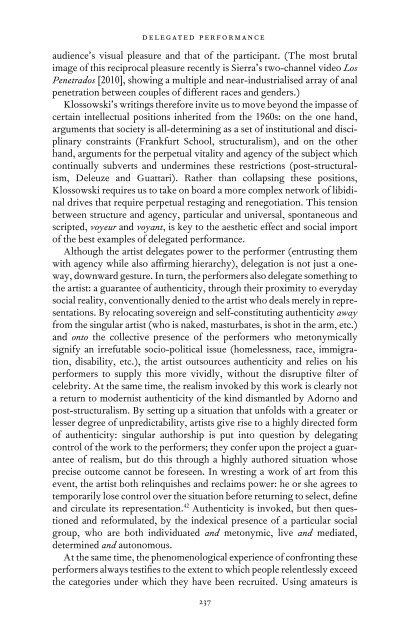Participatory Art and the Politics of Spectatorship - autonomous ...
Participatory Art and the Politics of Spectatorship - autonomous ...
Participatory Art and the Politics of Spectatorship - autonomous ...
You also want an ePaper? Increase the reach of your titles
YUMPU automatically turns print PDFs into web optimized ePapers that Google loves.
delegated performance<br />
audience’s visual pleasure <strong>and</strong> that <strong>of</strong> <strong>the</strong> participant. (The most brutal<br />
image <strong>of</strong> this reciprocal pleasure recently is Sierra’s two- channel video Los<br />
Penetrados [2010], showing a multiple <strong>and</strong> near- industrialised array <strong>of</strong> anal<br />
penetration between couples <strong>of</strong> different races <strong>and</strong> genders.)<br />
Klossowski’s writings <strong>the</strong>refore invite us to move beyond <strong>the</strong> impasse <strong>of</strong><br />
certain intellectual positions inherited from <strong>the</strong> 1960s: on <strong>the</strong> one h<strong>and</strong>,<br />
arguments that society is all- determining as a set <strong>of</strong> institutional <strong>and</strong> disciplinary<br />
constraints (Frankfurt School, structuralism), <strong>and</strong> on <strong>the</strong> o<strong>the</strong>r<br />
h<strong>and</strong>, arguments for <strong>the</strong> perpetual vitality <strong>and</strong> agency <strong>of</strong> <strong>the</strong> subject which<br />
continually subverts <strong>and</strong> undermines <strong>the</strong>se restrictions (post- structuralism,<br />
Deleuze <strong>and</strong> Guattari). Ra<strong>the</strong>r than collapsing <strong>the</strong>se positions,<br />
Klossowski requires us to take on board a more complex network <strong>of</strong> libidinal<br />
drives that require perpetual restaging <strong>and</strong> renegotiation. This tension<br />
between structure <strong>and</strong> agency, particular <strong>and</strong> universal, spontaneous <strong>and</strong><br />
scripted, voyeur <strong>and</strong> voyant, is key to <strong>the</strong> aes<strong>the</strong>tic effect <strong>and</strong> social import<br />
<strong>of</strong> <strong>the</strong> best examples <strong>of</strong> delegated performance.<br />
Although <strong>the</strong> artist delegates power to <strong>the</strong> performer (entrusting <strong>the</strong>m<br />
with agency while also affi rming hierarchy), delegation is not just a one-<br />
way, downward gesture. In turn, <strong>the</strong> performers also delegate something to<br />
<strong>the</strong> artist: a guarantee <strong>of</strong> au<strong>the</strong>nticity, through <strong>the</strong>ir proximity to everyday<br />
social reality, conventionally denied to <strong>the</strong> artist who deals merely in representations.<br />
By relocating sovereign <strong>and</strong> self- constituting au<strong>the</strong>nticity away<br />
from <strong>the</strong> singular artist (who is naked, masturbates, is shot in <strong>the</strong> arm, etc.)<br />
<strong>and</strong> onto <strong>the</strong> collective presence <strong>of</strong> <strong>the</strong> performers who metonymically<br />
signify an irrefutable socio- political issue (homelessness, race, immigration,<br />
disability, etc.), <strong>the</strong> artist outsources au<strong>the</strong>nticity <strong>and</strong> relies on his<br />
performers to supply this more vividly, without <strong>the</strong> disruptive fi lter <strong>of</strong><br />
celebrity. At <strong>the</strong> same time, <strong>the</strong> realism invoked by this work is clearly not<br />
a return to modernist au<strong>the</strong>nticity <strong>of</strong> <strong>the</strong> kind dismantled by Adorno <strong>and</strong><br />
post- structuralism. By setting up a situation that unfolds with a greater or<br />
lesser degree <strong>of</strong> unpredictability, artists give rise to a highly directed form<br />
<strong>of</strong> au<strong>the</strong>nticity: singular authorship is put into question by delegating<br />
control <strong>of</strong> <strong>the</strong> work to <strong>the</strong> performers; <strong>the</strong>y confer upon <strong>the</strong> project a guarantee<br />
<strong>of</strong> realism, but do this through a highly authored situation whose<br />
precise outcome cannot be foreseen. In wresting a work <strong>of</strong> art from this<br />
event, <strong>the</strong> artist both relinquishes <strong>and</strong> reclaims power: he or she agrees to<br />
temporarily lose control over <strong>the</strong> situation before returning to select, defi ne<br />
<strong>and</strong> circulate its representation. 42 Au<strong>the</strong>nticity is invoked, but <strong>the</strong>n questioned<br />
<strong>and</strong> reformulated, by <strong>the</strong> indexical presence <strong>of</strong> a particular social<br />
group, who are both individuated <strong>and</strong> metonymic, live <strong>and</strong> mediated,<br />
determined <strong>and</strong> <strong>autonomous</strong>.<br />
At <strong>the</strong> same time, <strong>the</strong> phenomenological experience <strong>of</strong> confronting <strong>the</strong>se<br />
performers always testifi es to <strong>the</strong> extent to which people relentlessly exceed<br />
<strong>the</strong> categories under which <strong>the</strong>y have been recruited. Using amateurs is<br />
237
















